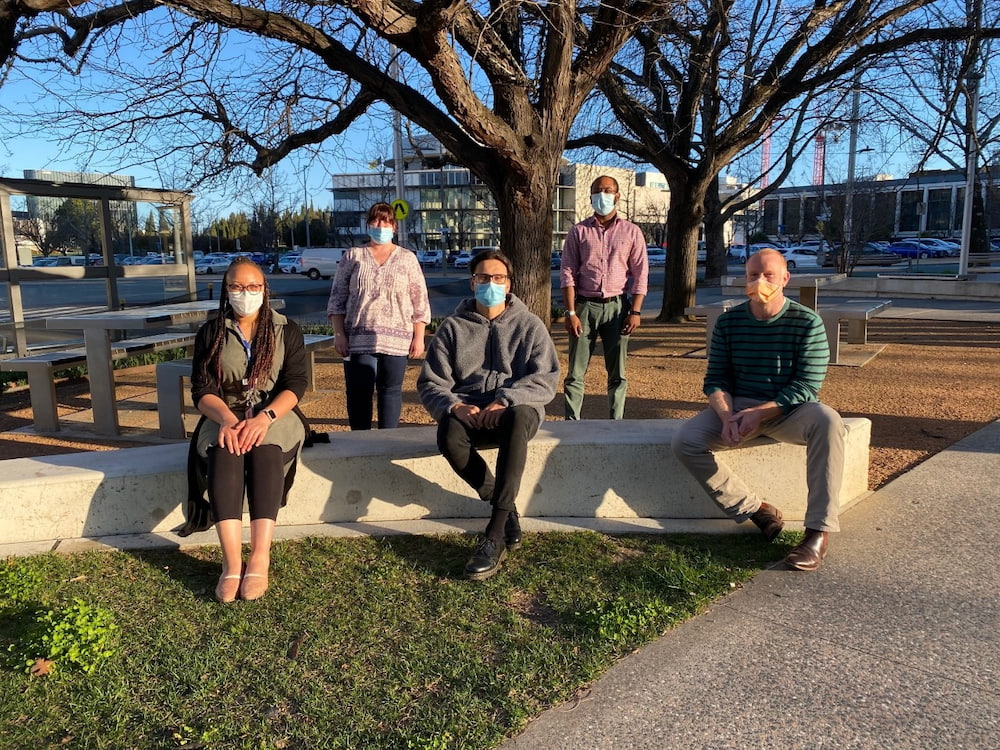The pandemic has left Canberra’s homeless people at a particular disadvantage, according to ACTCOSS CEO Dr Emma Campbell. Many do not have access to information, healthcare, or other essential services as a result of lockdown, and are at risk of breaching health orders as they cannot stay home.
Many people living on the streets have mental illnesses, and the demand on mental health services has increased.
“People who have severe mental illness and are homeless or at risk of homelessness need extra support through lockdown to access basic needs such as food, medicine, and psychiatric care, and to understand and comply with public health orders,” explained Dr Elizabeth Moore, ACT Health Coordinator-General, Office for Mental Health and Wellbeing.
To help some of Canberra’s most vulnerable people during this time, the ACT Government last week invested $40,000 to extend the Homelessness Outreach Team (HOT), a program run by Canberra Health Services’ Mental Health, Justice Health and Alcohol and Drugs Service (MHJHADS).
The funding will provide more access to support services such as the National Disability Insurance Scheme, doctors, pharmacotherapy, and ACT Housing. HOT will also help homeless people to get tested for COVID-19 and to get vaccinated.
HOT was set up in June 2020 to look after the physical and mental health of this complex and vulnerable population, said the spokesperson.
Some homeless people have physical and mental health disorders; some are drug addicts; some have diabetes or lung disease. Many are transient, and so their health care is not consistent or regular. But HOT has been out on the streets, making sure that homeless people in Civic can find the services they need, from health to housing.
A Canberra Health Services spokesperson said the funding was an opportunity to provide more care and support to people experiencing mental health crisis and illness during their recovery. COVID-19, they said, had been “an incredible challenge” for MHJHADS at an operational level, as it had for all sectors of society.
Over the last year, thanks to MHJHADS, fewer homeless people have presented to hospital emergency departments, and they have spent less time in hospital. Ninety per cent of participants were referred to NDIS support services to meet their long-term needs and were linked to GPs. All the participants were referred to accommodation support services, and many who had been chronically homeless were able to find lodgings.
“People’s mental health, housing needs, and physical health care is addressed across the board,” the spokesperson said.
Telehealth appointments are now available for homeless people accessing community mental health services.
Dr Campbell said the funding for MHJHADS was a start, but the ACT’s high levels of homelessness and housing insecurity were caused by the housing crisis and a social security system that forces people into poverty.
“We need to invest in more public and community housing and we need to Raise the Rate of JobSeeker and other income support payments so that people can keep a roof over their head,” she said.
ACTCOSS had heard from its members that there was a significant increase in demand for homelessness services, including temporary accommodation, during the lockdown.
ACTCOSS also called for an eviction moratorium to protect vulnerable tenants who face eviction from being pushed into homelessness amidst a public health emergency and housing affordability crisis in Canberra.
Dr Campbell said homeless people must have information they needed about the pandemic. Homeless people often did not trust government authorities.
“It’s important they can access information, and, ultimately, vaccination from people they trust and have a relationship with,” she said.
“They should be able to attend a location where they are made to feel welcome and respected as any of us would want when accessing medical care and support.”
Welfare organisations may need more resources to help homeless people comply with public health orders, Dr Campbell said. “
They may not have access to a large stock of food and hygiene items, financial savings, medicines, masks, or the many other things that allow most of us to quarantine or lockdown comfortably and safely.”
Dr Campbell said it was not known how many homeless people had been vaccinated, and she worried many were not protected from COVID-19.
“It is really important that we have transparent and accurate data on vaccination rates across vulnerable populations, including people with disability, older people, people from migrant and refugee background and people experiencing homelessness,” she said.
“This is so we can understand who remains vulnerable, whether messages are successfully reaching target populations, and what more needs to be done.”
Canberra Health Services thanked health care providers, clients, and their families for their collaboration and support to deliver exceptional patient care.
“We acknowledge the impact that the COVID-19 pandemic and subsequent lockdown has imposed; compliance and cooperation between these services does not go unnoticed.”
For more news:



